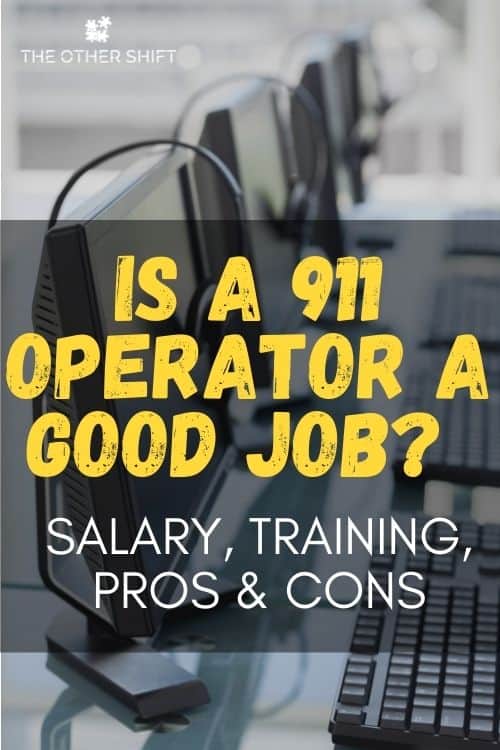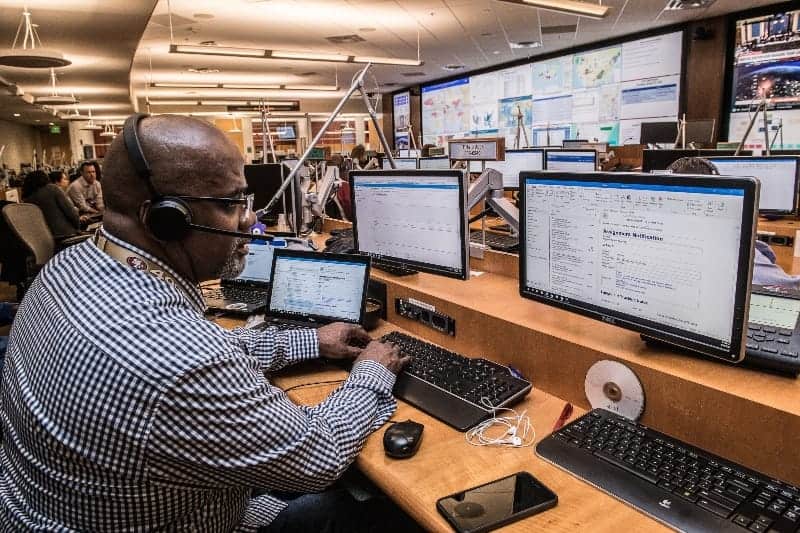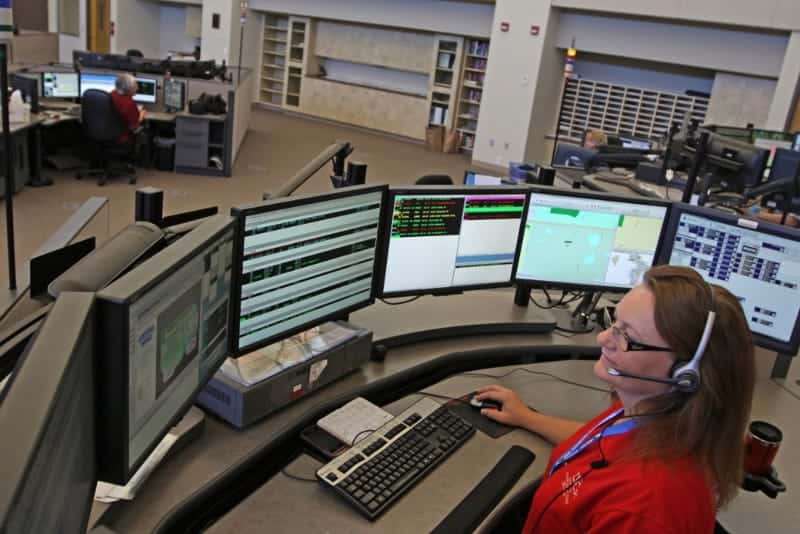Disclosure: This page may contain affiliate links, meaning we receive a commission if you decide to make a purchase through our links, but this is at no additional cost to you. Please read our disclosure and privacy statement for more info.
Between the thin blue line, white line, and red line lay the tiniest line of them all – the thin gold line. The thin gold line represents the voice in the midst of chaos and darkness; it represents 911 dispatchers. 911 dispatchers are the people that you make contact with as soon as you call 911. They are the ones in charge of inputting your call into a computer-aided dispatch system and sending out the appropriate units. There are so many different aspects that go into the job of a 911 dispatcher and operator. Most people think that they just answer the phone and that’s it, but there is so much more. The real question of the day though is, “is a 911 Operator a good job?”
There can be many benefits that come with being a 911 operator; great pay, creditable health insurance, and unique experiences. However, long work hours, burnout, and health issues are some potential downsides. Exceptional typing skills, along with clear and concise phone etiquette will make the job easier and more enjoyable.

What is a 911 Operator?
Let’s set the scene, say you are in the midst of a great emergency and you need assistance from police, fire, or paramedic.
You pick your phone up and dial the three numbers that everyone should know – 911. Almost immediately you are greeted by a voice on the other end of the line stating: “911, what is the location of your emergency?” That voice is one of many 911 operators across the nation. Do not let the word operator fool you, these are certainly not automated services (which, we’ve become so accustomed to), no, these are actually people. These are people who have their own thoughts, emotions, and life outside of the job.
So, aside from being the person to answer the phone and take your address – there is so much more that goes into being a 911 operator. After determining exactly where the complainant is located, they begin their line of questioning to determine what type of emergency services are warranted.
The array of incidents that a 911 operator can run into is pretty much unlimited. From domestic disputes in progress to loss of life, all of it goes through a 911 operator. With that being said, the line of questioning is different for every situation.
If it is a call that requires police presence, the 911 operator needs to determine whether or not there are any weapons, drinking, or injuries involved and act accordingly to their agency’s standard operating procedures.
If it is a medical call, the 911 operator needs to determine whether or not the patient is conscious and what their medical emergency is, and act accordingly to their agency’s standard operating procedures. This could include providing pre-arrival questions and instructions or transferring to an agency that does.
After the 911 operator takes the call and inputs it into the computer-aided dispatch system – their job is not done just yet.
For most agencies – the 911 operator doubles as the dispatcher as well. That means, while they are taking your call, they are simultaneously dispatching out appropriate units. This could be police, fire, or paramedics. 911 operators are the ones in charge of getting all these units to the correct location within a very limited timeframe.
You are then required to keep up with logging of all times for all three services that are offered. From enroute times to documenting radio traffic – as a 911 dispatcher and operator you would be required to keep track of all of it. As well as ensuring the safety of your first responders.
Don’t tune out just yet, there are still a few more components of being a 911 operator. Most people do not realize this, but not all calls that you are required to answer are emergency calls.
For example, most 911 agencies dispatch for certain agencies – meaning that they are required to act as the answering point for that agency as well. So, the majority of all non-emergency calls answered for local police departments, fire departments, or paramedic departments are answered by the same people answering 911 calls.
Most agencies have dedicated communication lines to take calls for things like;
- warrants
- animal control
- lift assist
- dialysis transport
- and much more
You may also be required to take care of things like housed warrants, sending requests to other agencies, and potentially dealing with inmates (depending on your agency.) There are so many different aspects that go into working as a 911 operator. It can often be overwhelming, but if you can persevere there are so many benefits you can take from it.

Training Required to Become a 911 Dispatcher
While the job description section above may be pretty lengthy, the section will not be as long. That’s a great thing for someone considering a job as a 911 operator!
When you think of a 911 operator, you may think that there are years of school involved and extensive training, but that really is not the case.
Now, there is extensive training involved, but it is all on the job training.
Unlike most higher-paying jobs, becoming a 911 operator does not require a degree. In fact, all you need is a GED or High School Diploma. You also need to be able to type.
Most agencies that you apply for only require that you take a typing test. That’s really the main skill that you need to come in with because the rest is teachable therefore it is learnable. However, most agencies just do not have the time it takes to teach someone to type.
After you take your typing test and are in the door – the rest you are taught. This is because no 911 agency that you are going to go to will be the same. Each is owned and operated by different districts, therefore, they do things that are tailored to the communities that they serve.
So some things that you will be for sure required to learn are;
- phone etiquette
- how to work the phone system
- how to work their operating systems
- and how to deal with each situation
This is months of both classroom training and on-the-floor training, so there is still a lot that goes into it – just not as much as one would think. So, do not let not coming into the job without prior knowledge or experience deter you away from trying!
Related post – Balance School and Night Shift: A Savvy Guide for Students

Working Hours for 911 Dispatchers
As a 911 operator, you should anticipate working during any day at any hour. Of course, 911 facilities are not able to close for any reason. Therefore, operations are for 24 hours a day, 365 days out of the year.
Now, that’s not to say that you would be able to work all of those hours, of course you would be put on a shift and work the days that rotation is scheduled for. Most agencies follow the 12-hour shifts. (Here are some tips for working 12-hour shifts). Meaning, on day shift you can work hours like 6am to 6pm or 6pm to 6am.
Most opt to have their employees work 36 hours one week, and 48 hours the next week. However, there are agencies out there that are the exceptions. Some have enough employees to work eight-hour shifts. So, again – it’s one of those things that depend on which agency you end up working at.
Wage / Benefits of Emergency Dispatchers
So what are the wages and benefits that come with working as a 911 operator? The question that everyone wants to ask during their interview, but is secretly too scared to ask!
Like most industries, wages and benefits differ from agency to agency. Each community is different, some are smaller than others, others have lower crime rates – all of that factors into the amount a 911 agency is willing to pay their employees.
There is no uniform payment, or no minimum (other than minimum wage). However, there is an approximate of what you could be making.
“The median annual 911 dispatcher salary was $41, 910 in May 2019, according to the U.S. Bureau of Labor Statistics. The highest 10 percent of earners made over $64,950, while the lowest 10 percent made under $27,190. According to Indeed, the average base 911 operator pay was $15.70 per hour in January 2021”
(Chon,2022)
When it comes to benefits, again – it depends on the agency that you are working for. Most offer the basics – health, dental, and 401ks. However, there are some that tac on a few extra incentives to get you in the door. For example, there are some that offer free mental health care, as working this job is known to cause damage to mental health.
So, let that be one of the questions you ask during your interview. Don’t feel afraid to ask for specifics on these, because they differ from agency to agency. Yes, you want to remain professional at all times, but your time and effort are just as valuable.
Making sure you are taken care of is not a bad thing.

Pros / Cons of Life as a 911 Dispatcher
Like I mentioned earlier, there are so many pros and cons that come with being a 911 operator. However, that’s any job that you work! You’ve got to understand the pros and cons for that specific job, and then determine whether or not you are interested in pursuing that direction any further. I’m going to list a few pros and cons of working as a 911 operator down below.
| Pro | Con |
|---|---|
| Competitive pay – Health benefits. | Long work hours |
| Networking | Can be emotionally traumatic |
| Helping others | Lives depending on you |
| Exciting work | Very sedentary |
| Low entry-level requirements | Emotionally demanding |
There are far more of both that could be listed, but those are the biggest ones. You can find a real career within 911. There are many different types of positions within a 911 centre, so the room for growth is there, you just have to be willing to put in the time and the work. The job is meant for some, and not for others. However, there’s no hurt in trying. Most people who get the job can tell you pretty early on in their training whether or not they think that this industry is one that they can handle.
[VIDEO] – Are Night Shift Bad For You? Stop Them Ruining Your Shift
As you can see – there is a lot that goes into being a 911 operator. There are both very rewarding parts of the job and very demanding parts to the job. If you are considering a job within the field, my suggestion to you is to be open to accepting the good parts of the job with the bad parts of the job.
Overall, being a 911 dispatcher is great, but a little weird.
You remain calm in the midst of chaos but have a mental breakdown when you lose a good pen. You take the good with the bad, and you get the work done because you are needed. The job is not for everyone though. It sees very little recognition from the outside world, and it can really take a toll on your mental health.
Other helpful posts:
- How to Survive Night Shift with a Desk Job
- 15 Tips To Improve Job Performance (Whilst Avoiding Burnout)
- Navigating Job Loss: What To Do After Leaving The Workforce
- Night Shift Worker Resume Guide: Structure, Style, and Content Needed to Get Noticed
So, be sure before you apply that you are willing to really deal with the not-so-great parts of the job. I can assure you that if you are looking for a job within the field, you can find one somewhere near you. There are so many 911 facilities that are understaffed and are constantly looking for great employees. So, if that is you – do a quick google search and find local 911 agencies that are hiring!
Now, you have a more in-depth understanding of what exactly a 911 operator does, and what it takes to become one. Now, all you have to do is take the next step. If you ever need more tips, refer back to this article. There really is some great stuff in here that can help you out along the way! Also, reaching out and speaking to people who are in the profession will really give you a sense of the industry!

Disclosure: This page may contain affiliate links, meaning we receive a commission if you decide to make a purchase through our links, but this is at no additional cost to you. Please read our disclosure and privacy statement for more info.
Recent Posts
Is Becoming a Veterinarian More Difficult Than Becoming a Doctor?
Choosing between whether to become a veterinarian or a doctor can be vexing. While they are similar in scope of knowledge, they are vastly different in terms of time consumed and money...
Is a Trucker's Life Hard? Quick Facts About Life on the Road
For many people, work will revolve around a commute to a destination. Whether that place is a school, factory, or bar, one thing is universal: we all hate traffic. What if there were a job where...

